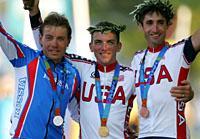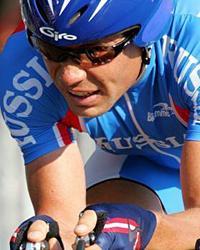Cycling News Extra for November 17, 2004Edited by Jeff Jones & John Stevenson How Russia and Australia will go for Hamilton's goldAnalysis by John Stevenson and Gerard Knapp
The Russian and the Australian Olympic committees' joint appeal to the Court of Arbitration for Sport to have Tyler Hamilton stripped of his Olympic gold medal may be more than just an ambit move to gain more medals. If the appeal is successful, Russian rider Viatcheslav Ekimov will be awarded the gold medal and Australia's Michael Rogers will get the bronze. (Hamilton's countryman Bobby Julich would step up from bronze to silver). According to Cyclingnews sources, neither the Russians nor the Australians would be bringing the case to CAS if they didn't think they had a good chance of success. But what could be the grounds for the appeal? Hamilton returned a positive A sample in the new homologous blood doping test, but World Anti-Doping Agency policy is that an athlete is only positive if both A and B samples return positive results. While there have been plenty of cases of athletes admitting they used a banned substance after a positive A sample, and so not asking for the B sample to be analysed, athletes have a right to request a B sample counter-analysis. In the case of Hamilton at the Olympics, the B sample analysis was inconclusive because the blood sample had been frozen rather than refrigerated. The test relies on examining whole red blood cells by a technique called flow cytometry; unless conducted using special techniques, freezing destroys red blood cells, making a sample useless for the test. According to Sean Winnette, spokesman for the Australian Sports Drug Agency (SADA) there is no precedent that the organisation is aware of for an athlete to be stripped of a medal on the basis of the A sample alone. Rick Christie, the Sydney sports lawyer who represented Australian rider Ben Kersten when Kersten was attempting to secure a berth on the Australian Olympic team earlier this year, was also unable to find such a precedent. However, it may be that the Russian and Australian case won't rely on such a precedent. "We are going to argue on different grounds," AOC media relations manager Mike Tancred told Cyclingnews. "Our in-house counsel, Simon Rofe, has been speaking to medical experts to understand the scientific basis of the test and if the B sample is actually necessary." ASDA's Winnette, while stressing that he was speculating, said that it may be that there is no need for a B sample in the blood doping test. "With urine [tests], an A and B sample is good to have because there can be degradation that leads to a false positive," said Winnette. "But this new test may only need one sample." Another historical reason for the use of two samples is to prevent cases of mistaken identity, but a blood sample can be DNA-tested to establish its bona fides, so again the need for a B sample to establish a doping case may be lessened. The team that developed the blood test also believes a B sample may not be scientifically essential. Dr Michael Ashenden, project coordinator for the Science and Industry Against Blood doping research consortium that developed the test, told Cyclingnews, "SIAB is a supporter of the appeal by the Russian and Australian Olympic Committees. SIAB believes there is no scientific reason for an A and B sample to confirm doping in the context of this situation." On the specifics of the Hamilton case, Ashenden added, "In Athens Hamilton returned an A sample that indicated blood transfusion. The fact that the B sample was destroyed does not affect the validity of the A sample finding. Therefore SIAB believes that there is evidence of the use of a prohibited method that is against the WADA code." Whatever the eventual decision of the CAS - and the hearing date has not been set - it should be final. "CAS decisions are binding," Tancred told Cyclingnews. "The IOC could appeal the CAS decision but [that is] extremely unlikely. The CAS was established by the IOC but it is a totally independent body." In the meantime, though, the AOC is remaining tight-lipped about the details of the case. Asked for further clarification, Tancred said, "[We] can't provide answers to the remaining at this point. Simon never talks to the media prior to a CAS Hearing. He doesn't believe in playing out the case in public prior to the hearing." Throughout this case, Hamilton has maintained his innocence and denied taking part in any form of doping, including blood transfusions. It's understood his legal defense will be built around proving the test can generate 'false positives'. Ekimov: nothing personal against Hamilton
"Some of your colleagues try hard to set us against each other, to create a clench, saying: 'Just a couple of seasons ago you were friends in arms in the same team, now you're enemies, what a transformation!' But that's rubbish - he's not my enemy in the least. We just have to keep different things apart; we have a situation where professionals take over - officials, lawyers, etcetera. Now, the Russian cycling federation and National Olympic committee have come to the fore, and I only want to be sure that the matter is sorted out properly." Ekimov finished second in the race in Vouliagmeni, 19 seconds behind Hamilton. Four years previously, he took a stunning victory in the Sydney Olympic time trial, beating Jan Ullrich and Lance Armstrong. Should he be awarded the gold from 2004, he would become the first male rider to win successive Olympic gold medals on the road. Ekimov also won an Olympic gold medal on the track in the team pursuit in 1988. "If professionals in the sphere of law decide that the gold belongs to me, I'll be satisfied to take it," Ekimov said. "If the ruling is in favour of the opposite, but I have a clear picture of what happened, and by law the medal belongs to Hamilton, I'll be satisfied as well. The atmosphere of suspense and gossip is not to my taste at all." Click here for the full interview with Viatcheslav Ekimov
(All rights reserved/Copyright Knapp Communications Pty Limited 2004) |

|
January 2009 |
Recently on Cyclingnews.com |


